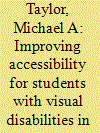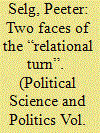| Srl | Item |
| 1 |
ID:
145071


|
|
|
|
|
| Summary/Abstract |
Science is believed to be an important part of public policy decision making because of its inherent characteristics of measurability, rigor, objectivity, replication, and peer review. The purpose of this research was to explore the linkage of science to public policy decision making. The research explores what state and local public officials know about science and how much they actually use science in their decision making. Interview results with public officials in the State of Idaho demonstrate that policy makers ultimately see science as only one element in the mix. Findings suggest that equal attention and debate should be given to how science interacts with all of the other factors that affect the public policy making process.
|
|
|
|
|
|
|
|
|
|
|
|
|
|
|
|
| 2 |
ID:
145074


|
|
|
|
|
| Summary/Abstract |
Experiential learning is a growing practice in higher education today. Master of Public Administration (MPA) programs use experiential learning to expose students to application and reinforcement of academic theories and concepts. This most often is accomplished through a required internship. This article argues for the addition of service learning requirements to MPA curricula. A complementary relationship between internship and service learning requirements yields four primary benefits: (1) further involvement of pre-service and in-service students in experiential-learning activities; (2) additional exposure to real-life application of course concepts; (3) better and more targeted classroom reinforcement mechanisms; and (4) additional community benefit. Complementarity between internship and service learning requirements allows the best of each experiential-learning approach to augment the other. We contend that this produces better-prepared MPA graduates by exposing them to a more diverse set of immersive learning opportunities and application scenarios.
|
|
|
|
|
|
|
|
|
|
|
|
|
|
|
|
| 3 |
ID:
145073


|
|
|
|
|
| Summary/Abstract |
As higher education has increasingly embraced digital technologies, we have been too slow to acknowledge accessibility issues for students with visual disabilities. One of the earliest promises of information and communication technology was increased accessibility to content. In theory, digitized content should be as equally accessible as the printed word on a screen, a braille keyboard, or an audible voice on a speaker. In the majority of educational technology, this promise has gone unfulfilled, and faculty members are largely unaware of the myriad obstacles that students with visual disabilities confront while navigating the technology-rich classroom. The principles of Universal Design in Instruction (UDI) provide guidance for developing curriculum that maximizes accessibility and usability of course content for all learners, including those with disabilities. This article examines the development of political science courses through the lens of UDI.
|
|
|
|
|
|
|
|
|
|
|
|
|
|
|
|
| 4 |
ID:
145072


|
|
|
|
|
| Summary/Abstract |
In the previous decade, the literature on “relational approach” has burgeoned in the social sciences. Recently, a “relational turn” in political science was called for in a symposium in this journal (McClurg and Young, 2011). The participants perceived a promising path for such a “turn” by introducing social network analysis (SNA) into political science. This call is informed by a conviction that the central concept of political science— that is, power—is relational. Considering this viewpoint, this article argues that there are two different understandings of the connection between the qualifier “relational” and the concept of power, referred to as the “Anglo-American” and the “Continental” perspectives. I contend that symposium participants conceived of the connection from only the Anglo-American perspective and that the Continental understanding would add extra value for political science.
|
|
|
|
|
|
|
|
|
|
|
|
|
|
|
|